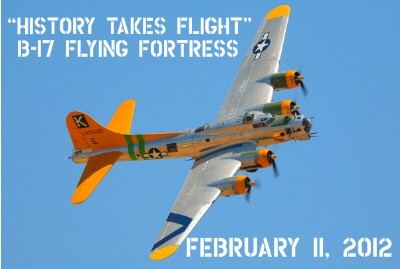LYON AIR MUSEUM B-17 FLYING FORTRESS ‘FUDDY DUDDY’ IN ‘HISTORY TAKES FLIGHT’ EVENT FEB. 11
Iconic WW II Long-Range Heavy Bomber Aircraft at John Wayne Airport
SANTA ANA, Calif., January 23, 2012—World War II comes to life on Sat., Feb. 11 at Orange County’s John Wayne Airport when the biggest, most powerful bird in Lyon Air Museum’s collection – the Boeing B-17 Flying Fortress “Fuddy Duddy” – roars into the air as part of the Museum’s “History Takes Flight” program.
“Our ‘History Takes Flight’ events enable us to share with the public some of the amazing aircraft made famous during the titanic global struggle for freedom that was World War II,” said Mark Foster, president of Lyon Air Museum, a premier Southern California showcase for vintage WWII era aircraft and automobiles.
“Our B-17, ‘Fuddy Duddy,’ is far and away the star of the museum, and we invite everyone to take this rare opportunity to come see this iconic heavy bomber in flight,” he said.
Lyon Air Museum’s B-17 was used as a VIP transport in the Pacific at the end of WWII. It once carried U.S. Army Generals Douglas A. MacArthur and Dwight D. Eisenhower, who later became the 33rd U.S. President. In civilian life, the plane worked as a fire bomber and was occasionally used for motion picture filming, flying on screen in movies such as the 1962 Steve McQueen movie, “The War Lover,” and the 1970 blockbuster, “Tora Tora Tora.”
Powered by four 1,200 horsepower engines driving four propellers, each over 11 ½ feet in diameter, the B-17 had a service ceiling of 35,600 feet and came equipped with a typical armament of 13 Browning fifty-caliber machine guns having a firing rate of approximately 13 rounds per second, per gun.
During the war, B-17 bombers were primarily employed by the U.S. Army Air Forces (USAAF) in the daylight precision strategic bombing campaign against German industrial and military targets. B-17s also participated to a lesser extent in the War in the Pacific, where the planes conducted raids against Japanese shipping and airfields. It was a potent, high-flying, long-range bomber that was able to defend itself and to return home despite extensive battle damage. It quickly took on mythic proportions, and widely circulated stories and photos of B-17s surviving battle damage increased its iconic status. Of the 1.5 million metric tons of bombs dropped on Germany by U.S. aircraft, 640,000 tons were dropped from B-17s, more bombs than any other U.S. aircraft type in WWII.
Lyon Air Museum opened in Dec. 2009. The facility, a 30,000-square-foot hangar, represents the fulfillment of a dream of founder General William Lyon. General Lyon held the position of Chief of the U.S. Air Force Reserve from 1975 to 1979 and currently is Chairman of the Board and CEO of William Lyon Homes, Inc., Newport Beach, Calif. His passion for aviation history and youth education is the driving force behind Lyon Air Museum. In establishing the museum, General Lyon sought to create a world-class facility that would be available to the local community and would offer educational displays to inspire young people. The museum has on exhibit some of the world’s rarest operational aircraft and vehicles.
Lyon Air Museum is located at 19300 Ike Jones Road, Santa Ana, CA 92707. P: 714/210-4585. F: 714/210-4588. Email: info@lyonairmuseum.org. Web: www.lyonairmuseum.org.
Hours of operation are daily from 10 a.m. to 4 p.m. Admission rates: General admission–$12; Seniors and Veterans–$9; Ages 5-17–$6; Under age 5—Free. Groups of 10 or more–$1 off each visitor. Pre-arranged school groups—Free.
Media Contact:
Corrin Quezada
Lyon Air Museum
714/210-4585



